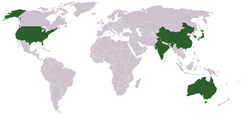Americans and Aussies Confident Industry Will Voluntarily Reduce CO2 Emissions

Government officials from the U.S. and Australia agreed publicly last week at the opening of a two-day climate change summit among Asia Pacific nations that the world’s industrial leaders could be counted on to voluntarily reduce emissions of carbon dioxide (CO2) widely thought to be exacerbating global warming.
“I believe that the people who run the private sector, who run these companies, they do have children, they do have grandchildren, they do live and breathe in the world,” said Samuel Bodman, U.S. Secretary of Energy. “It’s a matter of working with the leadership of these companies and seeking their participation.”
Alexander Downer, Australia’s foreign minister, concurred that the onus of CO2 emissions reduction falls on industry leaders, not governments. “The point here is that individual companies have to develop their individual strategies — we’re not trying to run a police state here,” he said.
Both men were speaking at the opening meeting of the Asia-Pacific Partnership on Clean Development and Climate, an ad hoc group consisting of senior officials from the U.S., Australia, Japan, China, South Korea and India and executives from energy companies. Many of the partnership’s members share the belief that mandatory emissions cuts—as called for by the Kyoto Protocol on Climate Change that the U.S. and Australia did not join—will do irreparable harm to their respective countries’ economies. While Japan, China and India are all Kyoto signatories, the latter two countries do not have any binding emissions targets under the pact due to their status as developing nations.
Source: www.msnbc.msn.com/id/10804249

